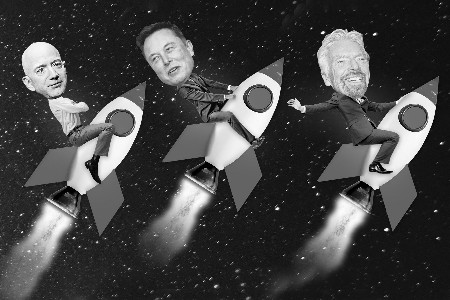It has been an interesting few weeks in the suborbital world of space travel. First, we had Virgin Galactic’s Sir Richard Branson, along with a compliment of a few fellow travellers achieve a suborbital 10-minute jaunt, shortly followed by Jeff Bezos and three going for their own 12-minute foray to the edge of space.
Listening to the post-conference and news coverage of these two billionaires waxing poetic about the experience left me searching for the meaning of it all. Branson and Bezos both claimed that what they had achieved was the first step in the commercialization of space, making it more accessible for the average Joe in the near future. But that is hardly the case. To me, the two fulfilled boyhood dreams with billionaire dollars.
They did Disney-like rides to the edge of space. No more. And now millionaires and billionaires with more money than they know what to do with can sign up for the same joyride to experience 3 to 4 minutes of weightlessness.
For the rest of us, we can have a similar near weightless experience by going swimming or riding a swing. How so?
With swimming, we don’t quite achieve zero gravity, but there is a reason NASA astronauts prepare for long-duration space missions by practicing in a neutral buoyancy tank, the largest and deepest swimming pool in the world. It’s the closest thing to microgravity humans can experience for an extended period of time.
With a swing, we get a glimpse of microgravity when centripetal acceleration at the top of the arc equals the acceleration of gravity creating a temporary microsecond of weightlessness when our bodies are aligned at 180 degrees parallel to the ground.
Branson and Bezos, along with Elon Musk’s SpaceX and other commercial space companies are all singing a tune from the same hymnal. Commercializing space is inevitable with our species achieving new conquests off our planet.
First, it will be in near-Earth space which we will occupy with commercially operated space stations for companies to do research and development in microgravity.
Then there will be space hotels where well-heeled consumers will “enjoy” a week or more confined to a space in outer space smaller than a studio apartment here on Earth.
From there we will expect ventures to move out to larger habitats located at Lagrange points in deeper space with great views of our entire planet and accommodations more suited to millionaires and billionaires and their lifestyles.
And of course, the dream includes habitats and space commercial ventures which within decades may be established on the Moon, and within another lifetime on Mars and beyond to the Asteroid Belt.
The driving forces behind this future, state Branson, Bezos, Musk and others, are the pursuit of commerce and satisfying our human curiosity. But the reality is these ambitions are being driven by boyhood fascinations with the science fiction of Buck Rogers and Star Trek.
So will the three amigo billionaires be the driving force behind the human conquest of the Solar System? The true reason for going to space is best captured by Branson who told the BBC after the Virgin Galactic flight, “I’ve wanted to go to space since I was a kid, and I want to enable hopefully hundreds of thousands of other people over the next 100 years to be able to go to space.”
Bezos’ vision is more complex. He described it to Anderson Cooper in a post-flight interview, where he talked about a future where heavy polluting industries migrate off Earth to space and exploit resources harvested from low-gravity-well sources like the Moon and asteroids, allowing Earth below to return to an Eden-like garden for humanity and the rest of life to enjoy.
Musk’s vision is existential but also seems caught up in childhood fantasy. I am sure, like most young boys, Musk was fascinated by dinosaurs. I certainly was and still am. Their catastrophic ending has captivated audiences from young to old for years. Musk sees us ending the same way the dinosaurs did. He wants to avoid that and as a result has been building SpaceX with a goal to put a city on Mars by mid-century, making humanity a multiplanetary species, and ensuring our survival should a catastrophe strike. This catastrophist vision of the future is his driving force which seems somewhat childish if not adolescent.
I understand Branson. Space is appealing to the inner child in him. Bezos’ Edenesque vision seems almost childishly naive. And Musk sees humanity’s end, like the dinosaurs as the existential crisis that space can solve. I would argue that if Musk wants to avoid catastrophe for humanity, that climate change be his principal focus. Because wouldn’t it be more useful to our planet and its future to see many of those billions of dollars these gentlemen are spending on suborbital space flights and pursuits of a city on Mars, on solutions to reverse global warming so that they can leave a legacy for the children of today and their future children that will be better than the one we currently are creating?
















